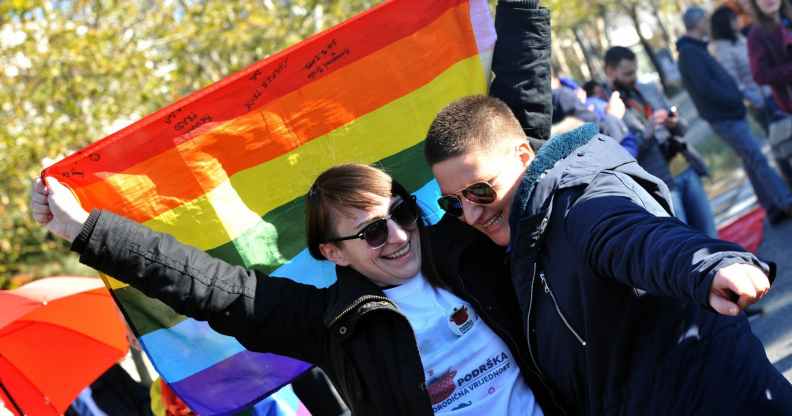Staunchly conservative Montenegro makes history with first same-sex civil partnership

Montenegrin activists hold a rainbow flag during the Pride parade in Podgorica in 2016.(AFP via Getty/ SAVO PRELEVIC)
The first-ever same-sex civil partnership has been registered in Montenegro, a year after the country narrowly legalised same-sex unions.
In July 2020, Montenegro became the first non-EU Balkan country to pass a law on same-sex civil partnerships. However, the decision was extremely close, with the law receiving 42 votes in the 81-seat parliament.
The ‘Law on Life Partnership’ gives same-sex couples almost all of the same rights as heterosexual married couples, barring the ability to adopt or foster children.
Since the law was passed, LGBT+ people in Montenegro have been left in limbo, waiting for amendments to multiple other laws and legal procedures.
Now, finally, the first legal same-sex partnership has been registered.
According to Balkan Insight, the union was between two women, who both live abroad but are of Montenegrin origin. They tied the knot in the town of Budva.
Milijana Vukotic Jelusic, a municipal official in the town, told the newspaper Vijesti: “We are glad that our municipality was able to be the first to apply the Law on Life Partnership and we wish happiness and a lot of love to the partners in their life together.”
Montenegro’s minister of public administration, digital society and media, Tamara Srzentic, added: “Although the law was adopted a year ago, much more needs to be done to meet all the preconditions for its full implementation.
“The LGBT+ community will always have an ally in me for all activities that contribute to improving the quality of their life.”
Half of Montenegro’s citizens think gay people are a danger to society
While same-sex civil unions are a step in the right direction, Montenegro remains extremely religious and conservative, and the country’s constitution has banned same-sex marriage since 2007.
Although the Montenegrin Parliament passed a law banning discrimination based on sexual orientation and gender identity in 2010, according to Balkan Insight, surveys have shown that 71 per cent of the country’s citizens view homosexuality as an “illness”, and half believe gay people are a danger to society.

